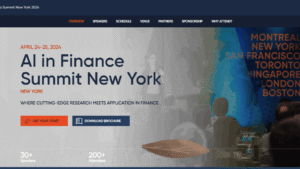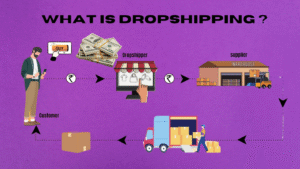AI in Finance Summit New York 2025: Innovations, Insights & Industry Impact
The AI in Finance Summit New York 2025 is scheduled for April 15-16, 2025, at Convene 237 Park Avenue. The summit offered a groundbreaking opportunity to gather over 300 participants from the finance and AI industries. In partnership with RE•WORK, the summit boasted 50 industry-leading speakers who discussed the latest innovations in AI technology and its use in financial services. AI’s continued evolution poses tremendous challenges and opportunities to every branch of finance. Tt was especially important for finance executives, data experts, and AI thought leaders to come together and rethink the financial landscape during this event. The summit emphasized the extraordinary potential of AI in improving productivity and cost-effectiveness as well as fostering innovation and competitiveness while dealing with critical issues such as ethics and regulation.

Recap of the Summit
AI in Finance Summit New York 2025 convened data scientists, financial practitioners, and AI technology specialists to examine the most sophisticated use cases of AI in business. It took place at Convene 237 Park Avenue, which hosts events such as keynotes, panels, and workshops. Among many other speakers, Cecilia Dones from Columbia Business School and Lingchen Guo from Visa addressed “Reinventing The Future Of Financial Services With AI/ML.” Other talks featured Koosha Golmohammadi from JPMorgan Chase & Co. and Dhagash Mehta from BlackRock, discussing AI applications for risk management and regulatory navigation. As described by CDO Magazine, the summit included tailored networking sessions which were designed to create new relationships and foster learning through collaboration.
Major Points and Lessons Learned
The Role of Generative AI in Open Bank & Quant Finance
This would be centered around the utilization of designated AI for open-banking enabled tailored financial products and improved predictive modeling in quantitative finance.
Synthetic Data for Financial Crime Prevention
This session, which Georgios Samakovitis From Greenwich University led, implemented synthetic datasets to fight privacy-preserving laundering and fraud.
AI Ethics and Regulation
In the frameworks of AI ethics, social responsibility, and fairness, transparency as well as accountability has drawn great humanitarian concern, which lies in compliance issues with regulations of Argyro Tasitsiomi from T. Rowe Price.
MLOPS Fostering AI Accessibility
The summit put its efforts towards exploring Machine Learning Operations, MLOPS, to ease AI deployment as it becomes challenging for financial institutions.
Computational Linguistics-Personalised Interactions
Advances in NLP technologies were proudly showcased to improve the ever-growing concerns regarding the avatar chatbots which interface with clients.
As it has been showcased by CDO Magazine, these reflections AI’s impacts on finance, spanning from operational agility enhancements to regulatory compliance aspects, are indeed multifaceted.

AI Technology in Finance: Statistics and Trends
The adoption of AI in finance is growing exponentially. ArtSmart states that the AI segment in finance is expected to increase from $712.4 million in 2022 to $12.3 billion by 2032 with a 33% yearly growth rate. All About AI reported that AI adoption in finance will reach 85% by 2025, with 60% of businesses harnessing AI in several departments. Moreover, AI is expected to save banks between $200 billion to $340 billion and reduce costs by influencing $450 billion in revenue. Statista also projects the spending on AI in the financial sector to increase significantly from $35 billion in 2023 to $97 billion by 2027, with a CAGR of 29%. That underscores the adoption of AI for operational efficiency in innovation.
Metric Table
| Metric | Value | Source |
|---|---|---|
| AI Market Size (2022-2032) | $712.4 Million to $12.3 billion USD | ArtSmart |
| AI Adoption Rate 2025 | 85% | All About AI |
| Bank Cost Savings 2025 | $200 to $340 Billion | All About AI |
| AI Spending 2023-2027 | $35B to $97B | Statista |
AI in Finance
AI in Finance functions gives huge potential benefits for financial institutions:
- Increase Workforce Productivity: Compared to older methods, AI tools can process transactions 90% quicker, improving operational efficiency (ArtSmart).
- Fraud Prevention: AI is used for fraud prevention and detection by 91% of banks in the US, which helps strengthen compliance (ArtSmart).
- Customer Experience: According to ArtSmart, 46% of financial entities have recorded enhancements in customer satisfaction due to AI-driven personalized service.
- Cost Cutting: Budget-friendly strategies are made possible by automation, which also drives down operating expenses.
The above benefits reinforce the notion of AI’s strategical value. As stated by Cecilia Dones: “AI is not just a tool for efficiency; it’s a strategic asset that can drive innovation and competitiveness in the financial sector.”
Risks and Ethical Concerns
Challenges posed by finance AI include the following:
- Algorithmic Bias: There is a risk that artificial intelligence systems will discriminate because they have been poorly designed.
- Cybersecurity Threats: A shift to these more digitalized systems will inevitably lead to greater cyber breaches.
- Employment: While automation will replace some jobs, it is predicted that AI will create 8–9% of new jobs by 2030 (ArtSmart).
- Ethics: Issues like transparency, data privacy, and fairness in AI judgment are grave matters, especially when addressed at the summit.

IMF papers stress that there is a need to closely work with the industry and regulators to come up with proper frameworks to deal with these challenges.
Future Outlook
The growth trajectory of AI within the financial sector looks optimistic. It is growing, as the Statista report projects financial firms will increase their AI investments to 97 billion USD by 2027, almost double the 2022 figure. Sophisticated models designed for the finance sector will emerge from such investment, enabling advanced predictive analytics and even more precise fraud detection. Increased regulation is also likely targeting the responsible use of AI, innovation and risk management during technology adoption. CDO Magazine was covering the summit and noted the voiced need to address ethical limits concerning AI.
Conclusion and Call to Action
NY 2025 AI in Finance Summit is a landmark event focusing on the financial services and showcased how deeply AI could transform them. The conversation led by industry heavyweights emphasized not only efficiency, fraud mitigation and customer engagement but also raised important questions about ethics and governance. It is important for finance-centered businesses to embrace AI and evolve with the technology while operating within boundaries of governance and safe practice. Explore your possibilities with AI and gain a competitive advantage by visiting RE•WORK.
Key Citations:
- RE•WORK AI in Finance Summit NY 2025 Official Website
- CDO Magazine – AI in Finance Summit NY 2025 Post-Event Wrap-Up
- ArtSmart – AI in Finance: Key Statistics, Trends 2025
- All About AI – AI in Finance Statistics 2025: Impact, Future Trends & Key Insights
- Statista – Artificial Intelligence (AI) in Finance – Statistics & Facts
- IMF – AI’s Reverberations Across Finance



















Post Comment